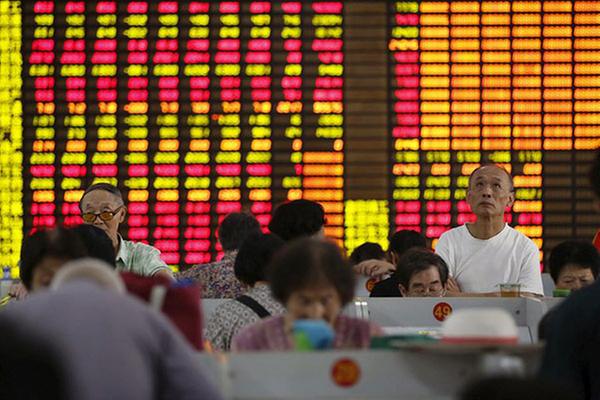Global fund managers betting big on A-shares
By OSWALD CHAN in Hong Kong | China Daily | Updated: 2017-07-25 07:20
 |
| Investors look at computer screens showing stock information at a brokerage in Shanghai, August 13, 2015.[Photo/Agencies] |
International asset managers said they were dynamically rebalancing their portfolios to invest in Chinese mainland's A-shares after the recent MSCI inclusion, with investment capital expected to pour into the world's second biggest equity market by capitalization-currently valued at $7 trillion to $8 trillion.
Hong Kong-listed exchange traded fund CSOP FTSE China A50 ETF, tracking the performance of the FTSE China A50 Index, recorded a massive increase in average daily turnover after the A-share inclusion in the MSCI indices on June 20.
As of July 19, the average daily turnover of the ETF in July had soared 75 percent to HK$571.6 million ($73.2 million), compared with average turnover of HK$326.4 million in May.
According to data from its mainland fund manager, CSOP Asset Management, the ETF has had about 1.6 billion yuan ($235.3 million) of net inflows since the MSCI announcement.
Global equity indexes provider Morgan Stanley Capital International announced on June 20 that it would include 222 A-share large market cap stocks in its MSCI Emerging Markets Index and MSCI China Index, representing 0.73 percent and 2.5 percent of the two indices respectively.
The included 222 A-shares are accessible via the mainland's two direct equity market trading links with Hong Kong and will not be subject to the qualified foreign institutional investor (QFII) quota. The inclusion will take place in two phases during May to August next year.
"MSCI's decision shows that foreign investors prefer blue chips with good quality, stable earnings growth and comparatively low risk," CSOP Asset Management's Chief ETF Strategist Alvin Li told China Daily.
"Following the MSCI inclusion, it will push up the value of large caps," he added.
The FTSE China A50 Index comprises the top 50 A-shares by market capitalization listed on the Shanghai and Shenzhen bourses. With a forward price-earnings ratio of around 10 times and earnings growth picking up, the index is poised to gain, analysts maintain.
Besides passive index fund investing, the MSCI inclusion also creates new investment horizons for active fund managers, sparking institutional investors' interest to study A-shares at the stock-picking level.
"The greater impact of China will lead to new investment opportunities and demand for more local research on Chinese companies," predicted Ian Hui, global market strategist at JP Morgan Asset Management.
"The A-share index will provide a better representation of the Chinese economy and diversified exposure to the current Chinese equity universe," noted Invesco's Chief Investment Officer for Asia, excluding Japan, Mike Shiao.
Analysts said the 222 A-share stocks will bring added weighting of industrials, healthcare, consumer staples, materials, information technology and telecommunications-as well as energy-to the indices.
At the same time, A-shares also contain a number of unusual companies that are not common in the offshore market-such as household furnishings and chemicals groups, renewable power producers, and biotechnology and pharmaceutical companies.
Analysts said investors had specific things on their shopping lists in the portfolio balancing exercise.
Bank of Singapore equity research chief Sean Quek said portfolio rebalancing after the MSCI inclusion had seen passive fund flows of $2 billion-$3 billion and active flows of $10 billion-$12 billion into various A-share investment funds-which compared with the average daily A-share market turnover of $65 billion in the year to date.
























